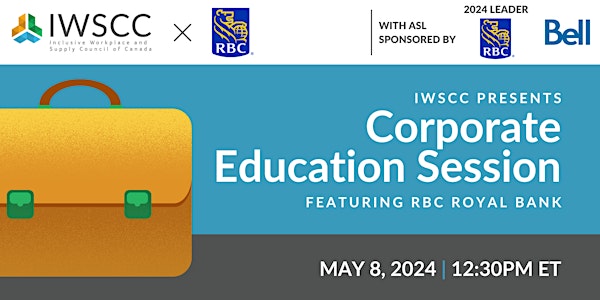
IWSCC and RBC Corporate Education Session
IWSCC invites you to our Corporate Education Series! This session provides education directly from RBC!
Date and time
Location
Online
About this event
- 1 hour
Organized by
Every Canadian has a right to meaningful work; to support themselves and their families. For Veterans and/or people with disabilities, that right is more of a privilege or not recognized at all. Across Canada, they are denied employment, paid less than peers and are less likely to hold management positions.
People with disabilities and Veterans face deep discrimination and stigma in society and the workplace. This must change!
For decades, these groups have started businesses as a means of survival because of critical challenges to entering the workforce. Over time, entrepreneurship has become the standard for many in this community with a driving commitment to proving their value within the business community.
The IWSCC now gives not just a voice, but a platform to ensure the same opportunities for procurement and employment as any other Canadian entrepreneur or employee.
Some quick facts...
In 2011, the employment rate of Canadians aged 25 to 64 with disabilities was 49%, compared with 79% of Canadians without a disability.
Approximately 1 in 2 university graduates, with or without a disability, held a professional occupation. However, graduates with a disability were less likely to hold a management position and earned less than those without a disability, especially among men.
A recent U.S. survey found U.S. Veterans 45% more likely than the non-veteran population to be self-employed. If the Canadian experience is similar, the percentage of self-employed Veterans in Canada would be about 15%
A substantially higher rate of people with disabilities are self-employed (11.8%) compared to the general population (6.6%).
Sources: The Bureau of Labor Statistics. (2012). Persons with a Disability: Labor Force Characteristics Summary. Spence, Rick (2014). New and veteran entrepreneurs: Think big before you start small. Financial post August 16, 2014
“Our research has two main messages: First, ‘one-size-fits-all’ types of training programs for entrepreneurs may not cater to the specific needs of entrepreneurs with disabilities. A heavier emphasis on building mentoring relationships and providing business knowledge is needed for this group since they enter the start-up process with lower levels of education and more restricted access to social support than other entrepreneurs. Second, making sure that people with disabilities do not fall further into poverty is essential if we want to encourage entrepreneurship in this group.” (Entrepreneurial entry by people with disabilities -Maija Renko, Sarah Parker Harris and Kate Caldwell; The University of Illinois at Chicago, USA)